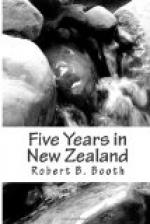At this river we found an accommodation house. I forget the name of the occupier, but I well recollect the appearance of the wretched structure, and of its landlord and landlady. What a pair of outcasts they looked, and how they existed on that wild bed of shingle! Their tastes must have been simplicity itself, and little satisfied them here below.
The landlord and his wife, with one other man, who assisted with the boat, were the only sojourners on this desert bed. Few travellers stayed at their wretched tenement, because being only ten miles from Dunedin they were generally able to push on, and partly because the locality did not possess pasturage for horses; and so with the exception of what they derived from selling an occasional nip of poisonous liquor to a passing traveller, their emoluments were derived from the ferry alone.
We were not fortunate enough to arrive in time to cross that evening, and were perforce obliged to stay at the accommodation hut till morning, or else return half a mile to where pasture was obtainable. The landlord, however, produced some hay and oats, and cleaned out his shed, in which we were able to put two of the horses, while the others were tied out, and so to save time and trouble we decided to make the best of what fare we could obtain.
The house comprised one room with a closet or bar off it. In the room, which was well enough when lit up by a good fire, we all supped together round a rough table with boxes from the bar for seats, our food the usual description, the junk of mutton boiled with lumps of dough called damper, and the landlady produced some plates, while we used our own clasp knives. Soon after, our weary bodies were strewn over the floor wherever we could individually select a fairly even spot, and the landlady, I believe, retired into the bar.
The following morning we put ourselves, horses, and baggage safely across the Waitaki, and by 10 o’clock arrived in Dunedin.
Dunedin was situated, like Port Lyttelton, on rising undulating ground, encompassed by an amphitheatre of hills which, to the south, extended to a point or promontory and gave shelter to the little harbour. Also, like Lyttelton, the latter was an open roadstead, but on the town front was bounded by a steep bank from which the narrow strand beneath was reached by a wide cutting. The town was quite in its infancy, but already possessed some well-laid-out streets and handsome wooden buildings.
As we anticipated, we found the good folk of Dunedin much exercised about the gold diggings. They were the first discovered in the country, and the town was in a fever of excitement for news of their success or otherwise. No very reliable information had come, but such as was obtainable appeared sufficiently satisfactory and encouraging to justify our making immediate arrangements for transporting ourselves thither.




